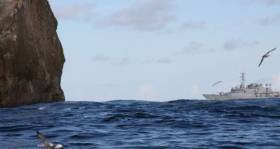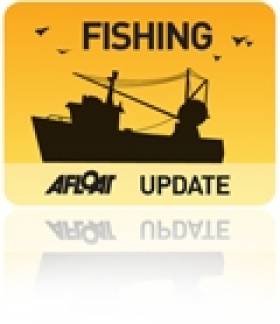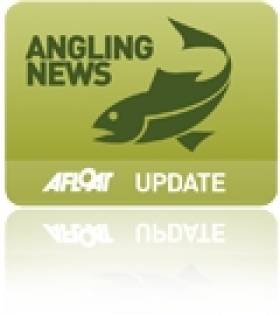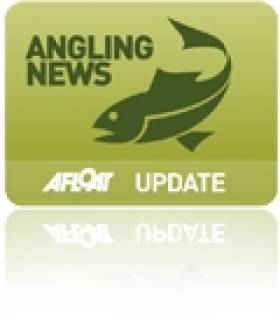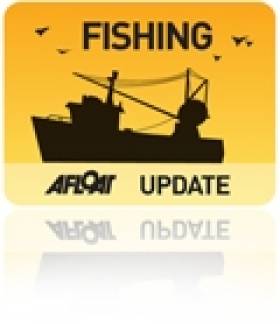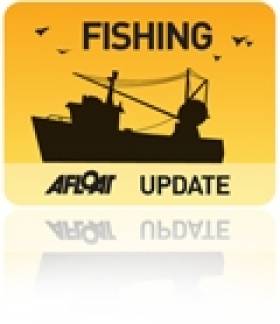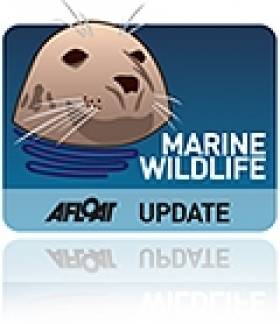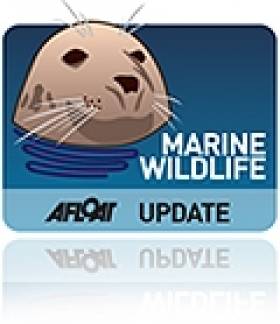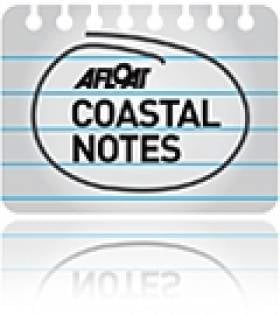Displaying items by tag: illegal
'lllegal' Irish Vessels Warns Scottish Minister Could be Boarded as Creed Dismisses Navy Involvement
Irish vessels are fishing “illegally”,writes the journal.ie, in the area around Rockall according to a Scottish Minisiter who said an “enforcement plan” will be put in place unless the ships desist from their activity there.
Speaking to RTÉ’s This Week programme, Scottish Minister for the Rural Economy Fergus Ewing said that this action will see Irish captains asked to cease and desist if they are found fishing in this area. If they refuse, he said further action would be taken “in accordance with the law” which would involve vessels being boarded.
However, speaking to the same programme, Minister for Agriculture Michael Creed said Ireland has never recognised the UK’s claim on Rockall, and that all legal avenues would be explored to allow Irish vessels to continue to fish there unhindered.
For much more click here including the issue of jurisdiction over Rockall which has long been disputed.
Two Men Prosecuted For Illegal Netting On River Nore
#Fishing - Two men have been prosecuted for illegal netting on the River Nore, downstream of Inistioge, at a recent sitting of Kilkenny District Court on Tuesday 14 October.
John Griffin and Tony Malone, both of Inistioge in Co Kilkenny, pleaded guilty to possession of a stake (fixed) net, use of a boat in the commission of offences, and obstructing a fishery officer.
Judge Eamon O’Brien convicted Griffin, imposing fines of €300.00 and awarded legal costs of €568.50 and convicted Malone, imposing fines of €200.00 and awarded legal costs of €568.50.
PJ Doran, fishery officer with Inland Fisheries Ireland (IFI), told Judge O'Brien that at around 2.15am on 11 July this year, he and fishery officer Jarlaith Gallagher observed Griffin pick up a net which they had hidden on the river bank.
Doran attempted to apprehend Griffin as he made his way back to his boat with the net, where Malone was waiting. A struggle ensued as Griffin attempted to board the boat, eventually escaping and speeding away. Doran and Gallagher clearly identified both men using night vision equipment and high powered torches.
Doran retrieved the net, which was a monofilament net measuring 20 meters in length and designed to fish as a fixed net. A fixed net is illegal and very different to a snap net, which uses nylon material and floats between two punts, meaning it is manned at all times.
Snap net fishing is a legal form of traditional fishing for salmon where each fish caught must be tagged and registered and is carefully managed by IFI. Griffin held a snap net licence for fishing on the Nore during the 2014 season, and has been convicted on two previous occasions for illegal netting of salmon.
David McInerney, director of IFI Clonmel, commented: “Fishing with a fixed net under cover of darkness is illegal and has the potential to do significant damage to our valuable salmon stocks.
"Unfortunately, the salmon population on the River Nore is in decline and illegal netting such as this is a serious environmental crime.
“Inland Fisheries Ireland puts significant resources into ensuring such activity is stamped out and we would urge members of the public to ensure they do not support this illegal activity by buying wild salmon which are caught illegally.
"Salmon legally caught on the Nore snap net fishery should all have a clearly identifiable white gill tag.”
IFI has a confidential hotline number to enable members of the general public to report incidents at 1890 34 74 24 or 1890 FISH 24. This phone line is designed to encourage the reporting of incidents of illegal fishing, water pollution and invasive species.
#Angling - Inland Fisheries Ireland (IFI) secured a conviction for illegal fishing in Waterford earlier this month over an incident last summer that quickly escalated from a fisheries investigation to a search and rescue operation.
Brendan Keane was prosecuted for illegal netting of bass in Tramore Bay on 25 August 2013 at a sitting of the District Court last Wednesday 2 May.
Keane, of Grantstown in Co Waterford, pleaded guilty to possession of a net, use of a boat while illegal fishing, and obstructing and impeding IFI officers, all contrary to the 1959 Fisheries Consolidation Act, and possession of nine bass contrary to a 2007 bye-law.
IFI inspector Tony O'Dwyer outlined in detail to Judge Kevin Staunton the complex series of events which unfolded when he and a colleague, with co-operation from the Garda, were investigating illegal netting of fish near Saleens, Co Waterford around 5am on the day in question.
O'Dwyer and fishery officer Isaac Ferns discovered Keane and an accomplice illegally fishing with a net and a small boat under cover of darkness in an area renowned by anglers for its stocks of salmon, sea trout and in particular wild bass, the sale of which is banned in Ireland.
When confronted, Keane began aggressively swinging an oar and roaring obscenities at the two IFI officers, and the court heard he was searching for his gun in the boat when the officers approached as he came ashore.
Keane and his accomplice retreated back to the open sea in their tiny unseaworthy boat, putting them in extreme danger. The tiny craft was not capable of dealing with the sea conditions and Keane had no buoyancy aid or lifejacket.
Gardaí involved in the incident said they were left with no choice but to alert the RNLI and Irish Coast Guard when what began as a fisheries investigation turned into a multi-agency marine search operation, including the deployment of a rescue helicopter when Keane's boat as round drifting without passengers.
Keane and his accomplice were subsequently found safely ashore but both refused to admit to gardaí that they had been the occupants of the drifting vessel.
IFI staff seized the small craft and a 120-metre drift net along with nine dead bass during the investigation.
Judge Kevin Staunton convicted Keane, imposing a four-month suspended sentence, with fines totalling €3,000, and awarding expenses of €751.02 to IFI. Keane’s boat and net were also forfeited.
Meanwhile in Galway, Judge Mary Fahy convicted two men of illegal fishing on the Clare River last summer at a sitting of Galway District Court on Tuesday 6 May.
James Fahy, of Ballindooley in Co Galway, was convicted of three offences on two dates in June and August 2013, while Michael McGath, of Castlegar in Co Galway, was convicted of one offence in August 2013.
Judge Fahy heard evidence from fisheries inspector Pat Gorman that on 18 June last James Fahy was observed using a net on the Clare River.
When approached, Fahy attempted to reverse his vehicle away down a side road, but fishery officers intervened. During the incident fishery officer Paul Reynolds was assaulted. Fahy was apprehended, and a search of the vehicle revealed a net, six large salmon and two large trout.
Fahy pleaded guilty to illegal possession of the fish, and to assault and obstruction. He pleaded guilty to a further charge of illegal possession of a net at the same location on 11 August, when he was again observed by fishery officers fishing and then concealing a net.
Judge Fahy convicted James Fahy and fined him €1,750 with €600 costs, and ordered him to pay €500 compensation to Reynolds. The judge also commented in court that illegal fishing hits already depleted fish stocks, and affects tourism.
She considered a driving disqualification in light of the use of the vehicle in the course of the offence, but as this was a first offence a driving ban was not imposed.
At the same court sitting, Michael McGath was convicted of illegal possession of a net on 11 August, and fined €100 with €600 costs.
IFI Secures Prosecutions For Illegal Fishing In Louth and Meath
#Angling - Inland Fisheries Ireland has secured victory in recent prosecutions against illegal fishing in Co Louth and Co Meath.
In Dundalk, Pat Smith of Annagassan, Co Louth was fined €100 for illegal salmon fishing and ordered to pay total costs of €460 to IFI in Drogheda District Court on 27 September.
His co-accused, Jimmy Mulroy, also of Annagassan, Co Louth was fined €100 for illegal salmon fishing and ordered to pay total costs of €777 to IFI in Drogheda District Court on 22 October.
On 13 June this year, Smith and Mulroy were found to be illegally fishing for salmon at Annagassan, which is the meeting point of the Rivers Dee and Glyde.
Fisheries officers Dermot Wynne, Thomas Duffy and Seamus Kelledy apprehended the two men, who pleaded guilty to the charges brought against them.
Judge Flann Brennan convicted both individuals under Section 95 of the 1959 Fisheries Act for having a net in their possession which was capable of capturing salmon.
Numbers of salmon in the entire Dundalk Bay area dropped from a 1970s peak of many thousands of commercially caught fish to an all-time low in 2006 when just 225 specimens were caught.
This led to the closure of all salmon fisheries in the region, with fishing restricted to catch and release only for salmon on the Dee and Glyde.
Elsewhere, IFI had success with recent court cases at Whitewood Lake in Kilmainham Wood, Co Meath resulting in fines of €500 issued and expenses of €2,024 awarded.
Jonas Kavaliauskas of Clondalkin, Dublin 22 was apprehended by fisheries officer Ronan O'Brien while fishing suspiciously at Whitewood Lake in May this year.
Kavaliauskas was found to have 57 coarse fish in his possession. This is in breach of the coarse fish byelaw which allows an angler to have four coarse fish under 25cm.
This case was heard on 20 September at Kells District Court and Kavaliauskas pleaded guilty. Judge Denis McLaughlin convicted him for breaches of the coarse fish Byelaw 806 of 2006. The defendant was fined €100 with six months to pay and IFI was awarded €714 in expenses.
A second case was heard on 9 October at Navan District Court, which heard that in August this year Petre Tuica of Nephin Road, Dublin 7 and Iosif Ciocan of Fernleigh, Dublin 15 were fishing at Whitewood Lake and found to be in possession of 60 fish.
Both individuals were apprehended by Assistant Inspector Ronan O’Brien as they had more than four coarse fish in their possession.
Ciocan did not appear in court and Tucia pleaded guilty. After hearing the evidence, Judge Patrick Clyne found both defendants guilty and convicted them for breaches of the coarse fish Byelaw 806 of 2006.
Ciocan was fined €200 with 14 days to pay with five days imprisonment in default and to pay €655 in costs. Tucia was fined €100 with one month to pay with five days imprisonment in default and to pay €655 in costs to IFI.
Whitewood Lake is a notable coarse fishery in the Kilmainham Wood area of Co Meath containing stocks of roach, bream, hybrids and pike.
Illegal Bass Netting Prompts Multi-Agency Operation Near Tramore
#Fishing - A duo caught illegally fishing for bass off Tramore put themselves in "extreme danger" by going to sea in an unseaworthy boat.
Staff of Inland Fisheries Ireland (IFI) were working with the Garda investigating illegal netting of fish near Saleens in Co Waterford around 5am on Sunday morning last (25 August) when they came upon the tiny craft, which was not capable of dealing with the sea conditions, and had only one buoyancy aid for its two occupants.
IFI fisheries officers and gardaí were left with no choice but to alert the RNLI and Irish Coast Guard when what began as a fisheries investigation turned into a multi-agency marine search operation.
Thankfully the two people from the tiny craft were later found safely ashore. IFI subsequently seized the small craft and a 120m drift net, along with nine dead bass.
In a statement, IFI emphasised that fishing for bass is illegal, and that such activity has the potential to do huge damage to stocks.
The sale of wild Irish bass is also illegal, and it is important that the public does not support illegal fishing by buying such fish.
A file is being prepared by IFI with a view to prosecuting the fisheries offence.
IFI director David McInerney said it is incredible the risks that are undertaken by people undertaking water based activities.
The area in question is famous for having great stocks of bass and sea trout, but sadly has been the location for a number of tragic drowning’s in recent years.
IFI Seizes Illegal Bass and Nets Off Waterford and Wexford Coast
#FISHING - Inland Fisheries Ireland has in the last week seized illegally caught bass off the Wexford coast and illegal fishing nets off the Waterford coast.
While the specifics of these cases are not being released for legal and operational reasons, IFI says that the successful seizures are the result of "the flexibility and dedication of IFI staff".
The national fisheries body said that these types of seizures are often initiated following significant covert, intelligence-led policing operations which are carried out during both day and night time.
In both instances off-duty fisheries staff were quickly mobilised to execute the seizures.
The regional director at IFI praised the staff involved in the operation and described the seizures as very important in the protection of Ireland’s bass, salmon and sea trout resource.
It is widely held that illegal coastal fishing could have devastating consequences on the nation's valuable fishery resource.
#NEWS UPDATE - The Irish Petroleum Industry Association (IPIA) has proposed a suite of measures aimed at tackling the problem of illegal diesel washing in Ireland.
In a statement, the industry body for Ireland's fuel industry says that the practice is costing the Exchequer as much as €155 million annually in lost fuel duty.
"While other jurisdictions have to tackle this sort of fraud, the sheer scale of criminal washing of diesel is a particularly Irish disease," it said.
The IPIA's recommendations include the introduction of "a strong regulatory regime" to control the sale of rebated fuel, a new market for off-road diesel that is harder to disguise or remove, the closure of unlicenced filling stations, and a "radical overhaul" of the currently "absurd" penalties for offending retailers.
The Irish Angling Development Alliance (IADA) has fully backed the IPIA's proposals, citing the dangers of toxic waste byproducts from diesel washing operations.
"This toxic waste has been dumped illegally across the country, where it can enter the water table, not only seriously polluting water courses but also clean drinking water supplies."
Garda Investigates Waterford Seal Shootings
#MARINE WILDLIFE - Newstalk reports that gardaí are investigaing the shooting of seals on a Waterford beach.
As previously reported on Afloat.ie, fears are mounting of an illegal cull of marine wildlife in the area after a seal and a dolphin were found dead from gunshot wounds within a day of two seals being discovered with similar wounds.
All four animals were found along the same stretch of Tramore Beach late last month.
A spokesperson for the Irish Seal Sanctuacy pointed the finger at an illegal cull allegedly carried out by local fishermen.
The Irish Wildlife Trust has welcomed the Garda investigation into the incidents, and has called on the public to report any relevant information they may have.
Fears Over Illegal Cull as Seals, Dolphin Die on Waterford Beach
#MARINE WILDLIFE - Fears are growing of an illegal cull of marine wildlife after a seal and dolphin were discovered dead on a Waterford beach - just hours after two seals were found dying from bullet wounds in the same location.
TheJournal.ie reports that the wounds on the two animals found on Tramore Beach on Thursday are also believed to be from gunshot.
Two grey seals were euthanised the previous evening after they were discovered gravely injured with "horrific" wounds on the same beach.
A spokesperson for the Irish Seal Sanctuacy (ISS) has called for a post-mortem of the animals to determine the exact cause of death - but pointed the finger at an illegal cull allegedly carried out by local fishermen.
"We’re not against a properly regulated cull," said the ISS's Johnny Woodlock, "but it’s the guy who goes out with a shotgun and takes potshots, that’s what we’re against.”
TheJournal.ie has more on the story HERE, including an image that many may find distressing.
Coastwatch Warns Over Draining of Cork Wetlands
Ballyvergan marsh is under threat after the discovery of an illegal pipe being used to drain the wetlands area, claims Coastwatch.
The Irish Times reports that the environmental group has called for immediate action over the draining of the marsh near Youghal in Co Cork.
Cork County Council has also confirmed to the paper that a letter regarding an "allegation of unathorised development" has been sent to the landowner.
The marsh at Ballyvergan is one of the largest on the south coast, and is zoned as a special amenity. It is also an important breeding site for migratory birds.
Karin Dubsky of Coastwatch said that the situation highlights the deficiencies in State policy regarding Ireland's wetlands.
The Irish Times has more on the story HERE.


























